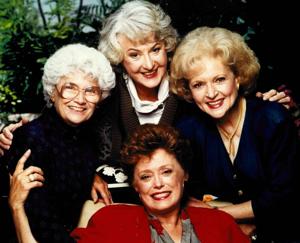Health
Millennial Women Embrace ‘Golden Girls’ Living with Friends

More millennial women are choosing to live with friends instead of pursuing traditional family structures, a trend reminiscent of the beloved television show “Golden Girls.” This shift reflects changing attitudes towards relationships, home ownership, and personal fulfillment.
A notable statistic reveals that in Canada, roommate households experienced a remarkable growth of **54 percent** between **2001 and 2021**, making them the fastest-growing household type in the nation. According to a survey by Leger for Royal LePage, **6 percent** of homeowners share ownership with someone other than a spouse or partner, and one-third of realtors have noticed an uptick in homebuyers looking to co-purchase properties. The rising costs of housing and a challenging dating landscape are driving this trend, as many individuals seek deeper connections with friends rather than adhering to traditional romantic scripts.
In a society where the narrative often emphasizes finding a partner and starting a family, some women are redefining what a successful life looks like. Relationship coach **Victoria Yeung** notes, “Thanks to the internet, we’re starting to hear about more alternative future-planning set-ups, like friends raising a child together or pooling resources to start small communities.” This shift in perspective allows friendships to serve as the foundation of adult life.
**Kendra Austin**, a popular TikTok creator, shares her experience living with her best friend. In her view, their relationship mirrors the partnership typically expected in romantic settings. “We care for each other in the same way we expected partners to,” Austin explains. This arrangement has contributed to her clarity about what she seeks in a romantic partner, highlighting the emotional support and shared responsibilities that come with cohabitation.
In **2021**, after years of planning, **Sarah Scanlon** and her friend **Jen** purchased a home together in **Guelph, Ontario**. For Scanlon, this decision was intentional and empowering. “I’ve always known living alone with a partner wasn’t the right fit for me,” she states. Their friendship, lasting over a decade, provided a solid foundation for their cohabitation. “We had lots of practice working through conflict and a lot of trust in each other,” Scanlon adds.
Their arrangement includes practical measures such as a co-ownership agreement and regular financial and emotional check-ins. “We bring up issues early, before resentment builds,” Scanlon explains, emphasizing that their home should feel grounding and safe. Despite challenges, such as a kitchen renovation that tested their patience, Scanlon considers their living situation one of her best life decisions.
While this kind of platonic arrangement is still relatively uncommon, it reflects a growing recognition that meaningful relationships can exist outside traditional romantic frameworks. Yeung explains that societal norms often prioritize romantic love over friendships, perpetuating the belief that a woman’s value depends on her relationship status.
For **Mia Cosco**, moving in with friends was a strategic decision influenced by the challenging rental market in **British Columbia**. “It’s rough out there,” she notes. Together with two colleagues, they combined their resources to secure housing, viewing their arrangement as both a temporary solution and a supportive community. Their different motivations for cohabitating illustrate the diverse ways women are choosing to live together.
Building a life with friends demands dedication and effort. Strong friendships require investment, similar to what is expected in marriages. Open discussions about finances, space, and appreciation rituals are crucial. This approach fosters autonomy while allowing for shared resources and emotional support.
Yeung highlights the limitations of traditional narratives about love and relationships. “We’re told that if you haven’t found The One, you’re missing out on the best part of being human,” she states. Recognizing that love and intimacy can flourish outside of romance expands the possibilities for meaningful connections.
The vision for the future involves celebrating friendships as valid and fulfilling relationships. Whether living in a shared home adorned with mismatched decor or enjoying communal meals, the emphasis is on aligning living situations with personal values. This movement towards a “Golden Girls”-style future marks a significant cultural shift, one that embraces friendship as a cornerstone of modern life.
-

 Lifestyle1 week ago
Lifestyle1 week agoWinnipeg Celebrates Culinary Creativity During Le Burger Week 2025
-

 Science3 weeks ago
Science3 weeks agoMicrosoft Confirms U.S. Law Overrules Canadian Data Sovereignty
-

 Education2 weeks ago
Education2 weeks agoRed River College Launches New Programs to Address Industry Needs
-

 Technology3 weeks ago
Technology3 weeks agoDragon Ball: Sparking! Zero Launching on Switch and Switch 2 This November
-

 Science3 weeks ago
Science3 weeks agoTech Innovator Amandipp Singh Transforms Hiring for Disabled
-

 Technology3 weeks ago
Technology3 weeks agoWorld of Warcraft Players Buzz Over 19-Quest Bee Challenge
-

 Technology3 weeks ago
Technology3 weeks agoGoogle Pixel 10 Pro Fold Specs Unveiled Ahead of Launch
-

 Science3 weeks ago
Science3 weeks agoChina’s Wukong Spacesuit Sets New Standard for AI in Space
-

 Science3 weeks ago
Science3 weeks agoXi Labs Innovates with New AI Operating System Set for 2025 Launch
-

 Technology3 weeks ago
Technology3 weeks agoNew IDR01 Smart Ring Offers Advanced Sports Tracking for $169
-

 Technology3 weeks ago
Technology3 weeks agoGlobal Launch of Ragnarok M: Classic Set for September 3, 2025
-

 Technology3 weeks ago
Technology3 weeks agoFuture Entertainment Launches DDoD with Gameplay Trailer Showcase
-

 Technology3 weeks ago
Technology3 weeks agoHumanoid Robots Compete in Hilarious Debut Games in Beijing
-

 Technology3 weeks ago
Technology3 weeks agoInnovative 140W GaN Travel Adapter Combines Power and Convenience
-

 Business3 weeks ago
Business3 weeks agoNew Estimates Reveal ChatGPT-5 Energy Use Could Soar
-

 Science3 weeks ago
Science3 weeks agoNew Precision Approach to Treating Depression Tailors Care to Patients
-

 Health3 weeks ago
Health3 weeks agoGiant Boba and Unique Treats Take Center Stage at Ottawa’s Newest Bubble Tea Shop
-

 Technology3 weeks ago
Technology3 weeks agoDiscover the Relaxing Charm of Tiny Bookshop: A Cozy Gaming Escape
-

 Science3 weeks ago
Science3 weeks agoNew Study Reveals Surprising Impact of Gratitude on Helping Behaviors
-

 Technology3 weeks ago
Technology3 weeks agoQuoted Tech Launches Back-to-School Discounts on PCs
-

 Technology3 weeks ago
Technology3 weeks agoBorderlands 4 Promises Massive Changes with 30 Billion Guns
-

 Lifestyle3 weeks ago
Lifestyle3 weeks agoVancouver’s Mini Mini Market Showcases Young Creatives
-

 Education2 weeks ago
Education2 weeks agoAlberta Teachers’ Strike: Potential Impacts on Students and Families
-

 Science3 weeks ago
Science3 weeks agoInfrastructure Overhaul Drives AI Integration at JPMorgan Chase










